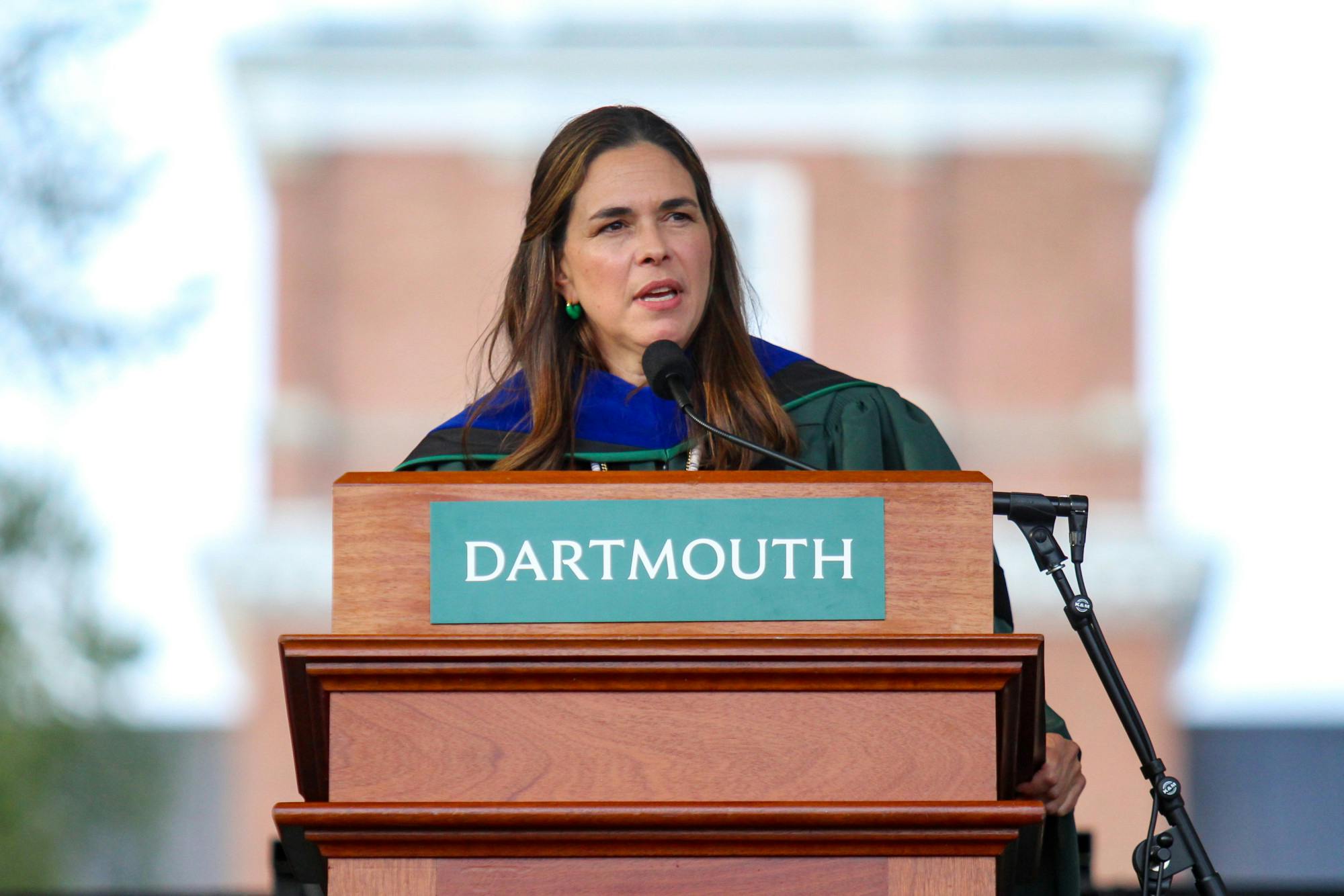Sian Leah Beilock was inaugurated at 4:30 p.m. today, becoming Dartmouth’s 19th president and the College’s first female leader in its 254-year history.
With Beilock’s appointment, Dartmouth became the seventh of the eight Ivy League institutions to be led by a female president.
According to College media relations strategist Jana Barnello, over 1,200 community members attended the inauguration ceremony, an event featuring speeches from alumni, Beilock’s former colleagues, faculty trustees and students.
In her address to the College, Beilock pledged reform to campus on what she said were “five key areas of focus.”
“Mental health, brave spaces, Dartmouth for life, action on climate, breakthrough innovation,” Beilock said. “This is my vision; these are our aspirations; and this is my call to action for you.”
Beilock announced plans to reform several of her outlined areas of interest. Regarding mental health, Beilock said the College would be unveiling a “comprehensive plan” on well-being in the next two weeks. On housing, Beilock said Dartmouth will introduce at least 1,000 new beds across campus over the next decade, breaking ground on new undergraduate housing in the next two years. To encourage free speech on campus, Beilock announced the first-ever university partnership with StoryCorps, the interpersonal communication non-profit organization. On climate, Beilock promised “specific and aggressive targets for 2030 and 2050.”
A number of speakers noted the beginning of Beilock’s tenure as coming at an inflection point in higher education. New Hampshire Gov. Chris Sununu, an ex officio member of the Board of Trustees, described Beilock — a cognitive scientist who has studied the effects of stress on education — as uniquely qualified for “a very transformative time for higher education across America.”
“We’re literally here inaugurating in the woman who wrote the book on performance under pressure,” Sununu said.
Beilock referenced her background in stress-related educational research during her address, explaining how her 20 years in the field have revealed “discrete steps we can take to better care for ourselves and others.”
Among her wellness goals, Beilock said she intends to expand mental health training for students and faculty, alleviate housing-related anxiety both on campus and throughout the Upper Valley and commit to athletic achievement.
“So, the single greatest service we can do for our students, our faculty, and our staff, is to support them on their wellness journeys,” Beilock said.
Vijay Govindarajan, Coxe Distinguished Professor at the Tuck School of Business, harkened back to the balance between institutional change and tradition — a common theme among the event’s speakers. Govindarajan added he “couldn’t think of a better leader than Dr. Sian Beilock” to prepare Dartmouth for the future.
“Organizations that do not innovate and change lose relevance,’’ Govindarajan said. “Innovate we must. Change we must. But we must innovate and change to create the future while preserving our core identity. This must be a purposeful act.”
Dartmouth’s future under Beilock has come during “a season of change,” artificial intelligence expert Allie Miller ’10 said during her inauguration speech. Whether in the technological space or otherwise, Miller said the College has the opportunity to catalyze change on campus, responding to events that fundamentally alter the student experience, such as affordable and accessible AI use, while maintaining Dartmouth’s ideals.
“Because change — genuine, sustainable change — does not bulldoze tradition,” Miller said. “It embraces the future without compromising on core beliefs. It honors tradition and holds it close, even as forging a new path, one that is more just, inclusive and innovative.”
Beilock placed an emphasis on innovation in her remarks as well, describing a potential pipeline in which discoveries made on campus could materially benefit the College. In one example, Beilock said royalties from Dartmouth’s contributions to COVID-19 vaccines would be reinvested into facilities and future research.
“Don’t get me wrong; discovery is important for its own sake, and our commitment to exploration across the arts and sciences will not waver,” Beilock said. “But we must strengthen our ability to translate our creations and discoveries into impact.”
During her speech, undergraduate student body president Jessica Chiriboga ’24 said she was “excited” by Beilock’s interest in brave spaces, a term the administration has used to denote areas on campus which encourage a “raw and open dialogue,” she added.
“We can lead higher education by committing fully to the robust exchange of ideas and to diversity, equity and inclusion, recognizing that the two are not mutually exclusive,” Chiriboga said.
In her address, Beilock said the College administration would promote a diversity of opinion.
“The best solutions are developed when a diversity of perspectives are brought to the table,” Beilock said. “So, we must commit to centering viewpoints and voices that aren’t always heard and to brave spaces to let that diversity of thought and lived experience shine through.”
In accepting the role and responsibilities of the presidency, Beilock closed her inaugural address with a call for partnerships on campus.
“Solutions to make the world a better place are out there; we just need to accelerate their development and apply them more broadly,” Beilock said. “And I have every confidence that we can.”




